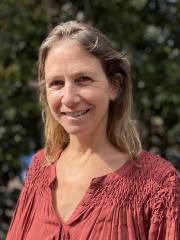
Marta Conde is a Marie Skłodowska-Curie Fellow at the Centre for Social Responsibility in Mining (CSRM) at the University of Queensland, Australia and the Institute of Science and Environmental Technology (ICTA) at the Autonomous University of Barcelona, Spain (UAB).
Marta’s research looks at the governance of extractive industries. Using political ecology, ecological economics, political economy and environmental justice she analyses the drivers, strategies and discourses of resistance movements to mining. Marta links her research to environmental justice and degrowth, exploring how these groups are successfully contesting the imperative of endless economic growth.
Marta commenced her research career at ICTA-UAB where she collaborated in several research projects around socio-environmental conflicts and Environmental Justice. She moved to the Geography Department at Durham University where she studied the governance of Deep Sea Mining (DSM). Prior to this fellowship, she was based at the Centre for Public Policy at the Universitat Pompeu Fabra, Spain where she was Co-PI in the project ‘Activism Mobilising Science’ exploring the science activism nexus. Drawing from political ecology and STS, she analyses the knowledge co-production processes in the governance of extractive industries, looking at issues around power, legitimacy and expertise.
During the Marie Skłodowska Curie fellowship (GROUT) she will explore the conflicts and governance arrangements that are occurring with the expansion of mining frontiers to more densely populated areas linking with planetary urbanization theses.
Research Interests:
- Governance of resource extractive industries
- Socio-environmental conflicts
- Just and energy transition, Green New Deal, transition minerals
- Deep Sea Mining
- Science and Activism, Knowledge co-production
- Environmental Justice
- Planetary Urbanisation
- Degrowth
Key Publications
- Conde, M., and Walter, M. 2022. Knowledge Co-Production in Scientific and Activist Alliances: Unsettling Coloniality. Engaging Science, Technology, and Society, 8(1), 150-170.
- Gorostiza, S., March, H., Conde, M., & Sauri, D. 2022. Corrosive flows, faulty materialities: Building the brine collector in the Llobregat River Basin, Catalonia. Environment and Planning E: Nature and Space, 25148486221105875.
- Conde, M., Mondré, A., Peters, K., Steinberg, P. 2022. Mining questions of ‘what’ and ‘who’: Deepening discussions of the seabed for future policy and governance. Maritime Studies.
- Toxopeus, H., Kotsila, P., Conde, M., Katona, A., van der Jagt, A. P., & Polzin, F. 2020. How ‘just’ is hybrid governance of urban nature-based solutions?. Cities, 105, 102839.
- Conde, M. and Le Billon, P., 2017. Why do some communities resist mining projects while others do not?. The Extractive Industries and Society.
- Conde, M. 2016. Resistance to mining. A Review. Ecological Economics, 132: 80-90.
- Conde, M. 2014. Activism mobilising science. Ecological Economics, 105, 67-77.
- Conde, M., Walter, M., 2014. Commodity Frontiers. In D'Alisa, G., Demaria, F., & Kallis, G. (Eds.)., 2014. Degrowth: A vocabulary for a new era. Routledge.
- Conde, M., Kallis, G., 2012. The uranium rush and its Africa Frontier. Effects, reactions and social resistance. Global Environmental Change 22(3): 596-610
